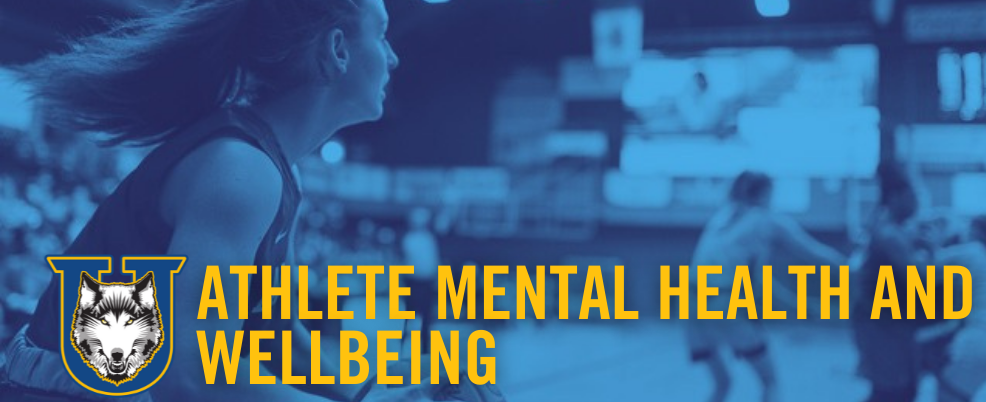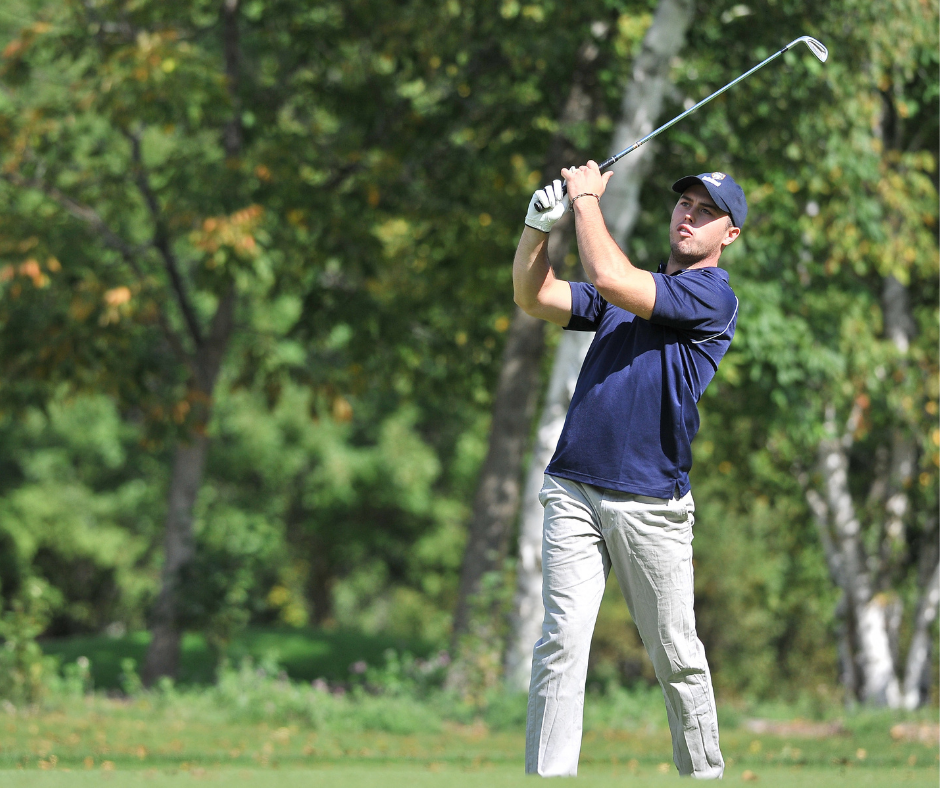
 Student-athletes experience a unique set of pressures when trying to balance academic commitments, performance goals, and a social life. The pressure to do it all (and to do it all extremely well) can be overwhelming and have an effect on one's mental health, and in turn, their performance both in sport and the classroom.
Student-athletes experience a unique set of pressures when trying to balance academic commitments, performance goals, and a social life. The pressure to do it all (and to do it all extremely well) can be overwhelming and have an effect on one's mental health, and in turn, their performance both in sport and the classroom.
Competitive athletes may be more vulnerable to mental health challenges than the normal population due to the complex demands, high expectations, limited support, early specialization, and year-round training/coaching they often face. Other factors such as excessive pressure to succeed, debilitative coaching styles, lack of funding, overtraining, injury, and difficult transitions in, through, and out of sport can precipitate existing mental health challenges or trigger the development of new ones.
Continuum of Mental Health
Common Mental Health Concerns
Below are some common mental health concerns that student-athletes may experience in their career.
| Balancing School, Sports and a Social Life |
You have a lot of demands on their time- classes, assignments, practices, individual training and travel- and trying to balance it all can be challenging. As a result, you are at an increased risk of the following:
That might seem alarming but with effort, you can be successful in balancing all of your commitments. See the section below for stress management strategies to help you. More Information and Resources |
| Performance Expectations |
Student-athletes may struggle when their expected performance does not match up with their actual performance. The goal is always to do well but if you feel an excess of pressure to do so (real or perceived), it might actually hinder your performance. Signs you may be struggling with some level of performance anxiety could be:
Note that these feelings can be pre, during, or post-competition. More Information |
| Anxiety |
Anxiety is one of the most commonly reported mental health issues reported by Canadian post-secondary students (NCHA, 2019). This trend holds true for student-athletes with 30% of male student-athletes and 45% of female student-athletes report excessive levels of anxiety (SAMHI). Signs and symptoms that anxiety is having an impact on your well-being can include:
For support and more information:
|
| Body Weight and Image Concerns |
Recent research has found that athletes are typically satisfied with their body image in social environments, but not within their sport. 18-26% of student-athletes struggle with subclinical eating disorders and 3-7% of athletes struggle with clinical eating disorders (Thompson et al., 2021). Athletes might also struggle with muscle dysmorphia, a disorder marked by a negative body image and an obsessive desire to have a muscular physique. Eating disorders can result in: amenorrhea (missed or irregular periods), dehydration, gastrointestinal problems, hypothermia (cold intolerance), stress fractures (and overuse injuries), significant weight loss, muscle cramps, weakness or fatigue, dental and gum problems, anxiety and/or depression and difficulty concentrating. Muscle dysmorphia can be marked by concerns and negative talk about being too small or weak, an embarrassment of their body shape, avoids situations that involve showing their body, use of supplements to bulk up, use of steroids to bulk up, eating obsessions around diet, supplements, and eating patterns, excessive training (particularly weight training), training when injured, or feels guilty when they miss a training session. More information and resources: If you are struggling with body image concerns, you can reach out to NEDIC helpline or chat support. Body Images and Eating Disorders
Nutrition / Supplements
|
| Burnout |
At some point, you may find yourself falling out of love with your sport, or overwhelmed by all the things you have to do in order to be successful in the classroom and in your sport and that is very normal. About 66% of student-athletes experience burnout at some point in their athletic career (Martignetti et al., 2020). Signs that you may be experiencing burnout include:
More information and resources |
| Depression |
While exercise can produce hormones that improve mood, athletes are not immune from depression, about 27% of student-athletes experience depression symptoms and 16% of athletes report severe depression symptoms (Drew & Matthews, 2019). This is equal to ~1 in 4 student-athletes having symptoms and 1 in 6 athletes having clinical levels of depression. It is normal to feel sad at times but signs you might be dealing with something more chronic can include:
Men also experience some lesser-known symptoms specific to their gender:
More information and resources
|
| Coping with Injury |
Injuries happen and university athletes sustain an average of 2 injuries per year (Lemoyne et al., 2017). Feeling frustrated or upset when an injury limits your ability to participate in sport or impedes your progress and performance is understandable. You can experience a variety of emotional responses and stress upon being injured, including:
More information and resources |
| Transitioning Out of Sport |
Ending your athletic career can trigger a number of physical, psychological, emotional, social, and lifestyle changes, seemingly overnight. It is a huge change for everyone but about 20% of athletes transitioning out of sport experience it as a crisis. Signs you might need to seek support to help manage the transition are:
More information and resources |
Strategies for Managing Stress

Stress can interfere with performance in academics and athletics, reduce overall wellness, and can predispose athletes to athletic injury. While stress is a universal student experience there are actions you can take to minimize its impact. Learning about implementing coping strategies before they are needed will help you deal with stressful situations when they occur.
The way a person copes or responds to the symptoms they experience can greatly influence the extent of their distress and the impact on their day-to-day functioning. Unhelpful coping strategies include avoidance and alcohol or substance consumption. Helpful coping strategies include healthy attempts to regulate emotions (e.g. talking to a friend, going for a walk) and proactive problem solving (e.g. making a plan to resolve a financial stressor).
| Mindfulness |
Mindfulness is non-judgmental awareness of our thoughts, senses, and environment. It helps manage stress by allowing you to step back from your thoughts and not take them so literally. That way, your stress response is not initiated in the first place. It also stops you from immediately reacting to a stressor, giving you time to come up with the best response. Finally, it can help change your perspective of stress altogether, rather than just seeing the negative consequences of feeling stressed, mindfulness offers you the space to think differently about the stress itself. There is more than one way to practice mindfulness so you might have to try a few to find the one that works for you. Meditation Mindfulness meditation is a type of meditation in which you focus on being intensely aware of what you're sensing and feeling in the moment, without interpretation or judgment. Practicing involves breathing methods, guided imagery, and other practices to relax the body and mind and help reduce stress. Student Health and Wellness regularly offers meditation sessions, or you can try a youtube video or app like Calm or Insight Timer. If all else fails, take a deep breath- learn different techniques and how proper breathing can reduce stress |
| Cognitive Strategies |
Cognitive models teach us that how we appraise a situation influences our moods. One can learn to better control their stress if they can gain more awareness of and better control over their appraisal process. Some strategies to try: Visit SHW Stress section for more resources and strategies. |
| Behaviour/Lifestyle Strategies |
|
| Time Management Strategies |
Lakeheads' Student Success Centre Academic Support Zone has various advice and supports
Prioritize your schedule
More Time Management Resources |
Resources
Seeking Help
 It’s pretty common for student-athletes to struggle at times during their post-secondary career. If you’re not enjoying your life academically, athletically, or personally, or are having difficulty making changes on your own, it’s time to reach out for help. You don’t have to navigate the bumps on the road on your own – there are people who want to help. It’s important to understand that you don’t need to have ‘something wrong with you’ to reach out-- being a mentally tough athlete involves knowing your own limitations, and knowing when to reach out for a hand.
It’s pretty common for student-athletes to struggle at times during their post-secondary career. If you’re not enjoying your life academically, athletically, or personally, or are having difficulty making changes on your own, it’s time to reach out for help. You don’t have to navigate the bumps on the road on your own – there are people who want to help. It’s important to understand that you don’t need to have ‘something wrong with you’ to reach out-- being a mentally tough athlete involves knowing your own limitations, and knowing when to reach out for a hand.
When we are reluctant to do something or try something new, it is easy to come up with reasons to avoid it. Seeking help for a mental health concern can be one of those things that student-athletes delay, defer, or avoid altogether. Below are some of the reasons why athletes might avoid help-seeking.
| Internal Barriers |
|
| External Barriers |
|
If you are struggling to ask for help:
- Remind yourself that mental health concerns are incredibly common.
- Understand it is normal to feel stressed and you may need support to develop healthy coping strategies.
- Recognize that it is proactive to seek help and to develop skills to manage pressures effectively.
- Accept that evidence consistently demonstrates that receiving psychological therapy from a trained professional is an effective way to promote healthy functioning.
- Realize that you actually don’t know if it will help until you try.
How to Help Others
Athletes spend a lot of time with their teammates and this can make it easier for them to notice changes and signs of distress. People are also more likely to open up to their peers- 67% of young adults tell a friend they are struggling before telling anyone else.
| Notice |
Noticing signs and symptoms Changes in thoughts, feelings, and behaviours that are…
Specific examples
|
| Engage |
How to start a conversation: Understand people may not want to talk about what going on because they do not want to seem like a burden
Address what you see
Be understanding and listen
|
| Refer |
|
| Resources |
Supporting Students in Distress |
Get Involved
If you are passionate about mental health and want to become an advocate for yourself and others, there are opportunities.
- Join the Student Wellness Advisory Team (SWAT). As a member of the SWAT team, you will help the Student Health and Wellness centre promote Health and wellness at Lakehead.
- Become a Peer Wellness Educator and develop wellness resources and events on campus or take part in their peer support group- Peer Chat.
- Promoting Thrive. Thrive is a week of promoting mental health literacy and reducing mental health stigma. You can help out with Thrive by promoting it on social media, in your classroom, and with your friends.




